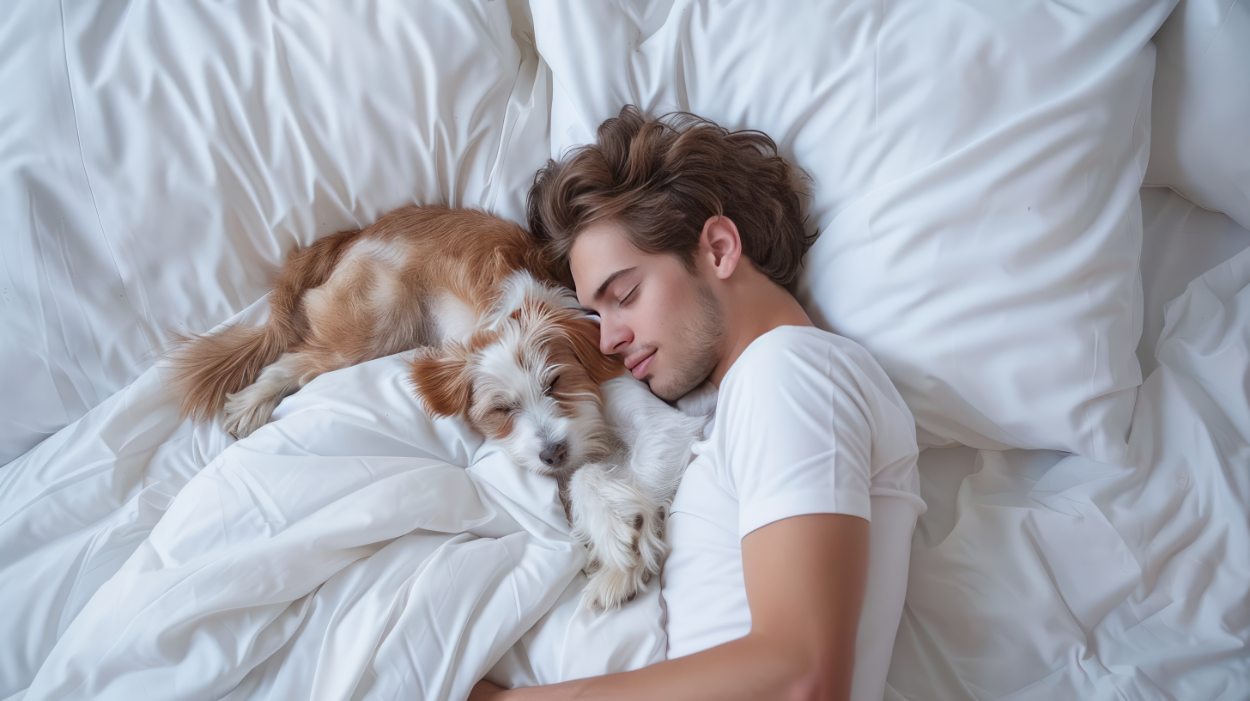Sleeping With Dogs: Why You Should & Why You Shouldn't
Women have been trying to ban dogs from my bed for as long as I can remember; my mother hated it. I fondly remember her lectures about dirty dogs in the bed.

I don’t know about your bed, dear reader, but when I wake up in the morning, my bed is so full of dog hair that I sometimes feel like a medieval peasant sleeping with his livestock. I wouldn't change it for the world unless a woman forbids it as they are prone to do. Women have been trying to ban dogs from my bed for as long as I can remember; my mother and grandmother both hated it.
I fondly remember them lecturing me about dirty dogs in the bed.
Sleeping with your dog has been a common practice for millennia, though I was simply doing what any other dog-loving little boy or girl had done throughout history. Many dog owners allow their warm and furry friends to share their beds because it is a profoundly comforting and bonding experience.
However, sleeping with your dog comes with benefits and risks.
Considering how much hair I have in my bed right now (she is shedding), I thought I should investigate and report back with my findings. So, in this article, we delve into the advantages and disadvantages of sleeping with your dog so you can make an informed decision about whether or not to let your dog into yours.
Why You Should Sleep With Your Dog
Emotional Bonding and Comfort
One of the primary benefits of sleeping with your dog is the emotional bond it fosters. Dogs are known for their loyalty and affection; sharing a sleeping space enhances the human-animal bond. The physical closeness provides a sense of companionship, which is comforting for people who live alone.
Stress and Anxiety Reduction
Numerous studies have shown that interacting with dogs can reduce stress and anxiety. The presence of a dog can increase the production of oxytocin, a hormone associated with bonding and relaxation. A dog's rhythmic breathing and warmth can have a calming effect, helping to alleviate stress and anxiety levels.
Improved Sleep Quality for Some
Having a dog in their bed can lead to better sleep quality for some people. The comfort and sense of security a dog provides can help some people fall asleep faster and experience fewer awakenings during the night. This is particularly true for those who suffer from insomnia or anxiety-related sleep disturbances.
Physical Warmth and Comfort
Dogs generate body heat, which is always appreciated during the winter. My own dog is basically a hot water bottle that stays warm all night and helps me stay warm on very cold nights. This can be especially advantageous for people with circulation issues or who simply enjoy the cozy feeling of sleeping with a dog.
Enhanced Feelings of Safety
Having a dog in bed can provide an extra layer of security because dogs have acute senses and can alert their owners to unusual sounds or potential threats. Even though I am unsure of my snoozy labrador's ability in this regard, I know that it can be reassuring for people who live alone or in places they feel less secure.
Why You Shouldn’t Sleep With Your Dog
I am a lost cause, but in the interests of balance, I thought it best that I at least pay lip service to why you should not sleep with your dog. My dog watches me as I type; she somehow knows my words are traitorous, and we both know that this article will probably be used against us in the future.
Sleep Disturbances
While some people find that their sleep quality improves with a dog in the bed, others may experience the opposite effect. Dogs can be restless sleepers, and their movements, scratching, or grooming habits can disrupt human sleep. This can lead to frequent awakenings, resulting in fragmented and poor-quality sleep.
Allergies and Asthma
For individuals with allergies or asthma, sleeping with a dog can exacerbate symptoms. Dander, which consists of tiny skin flakes shed by dogs, can trigger allergic reactions and respiratory issues. Even if you are not allergic, the presence of dander and fur in the bed can contribute to a less clean sleeping environment.
Hygiene Concerns
Dogs can carry dirt, bacteria, and parasites into the bed, which can pose hygiene concerns. Even well-groomed and regularly bathed dogs can bring in outdoor contaminants. This can be particularly problematic for individuals with compromised immune systems. My bed is never quite what you would call clean unless I just changed the sheets, and it's definitely my dog's fault most of the time.
Behavioral Issues
Allowing a dog to sleep in the bed can sometimes lead to behavioral problems. Dogs may develop dominance-related issues or become overly possessive of the bed. Suppose the dog perceives the bed as its territory and feels the need to defend it, with territorial behavior that nobody wants to see at bedtime.
Space and Comfort Constraints
Sharing a bed with a dog can sometimes result in space and comfort constraints. Depending on the dog's size and the bed's size, there may not be enough room for both the humans and the dog to sleep comfortably; the number one reason my dog gets kicked out of the bed whenever a woman is brave enough to get into it.
Alternatives to Sharing Your Bed with Your Dog
If sleeping with your dog in bed isn't the best option for you, a compromise can be found so that you can still enjoy the benefits of sleeping in the proximity of your dog. A good option is to give your dog its own dedicated sleeping space in your bedroom. A comfortable dog bed will allow your dog to be close to you without sharing the same sleeping surface. Another alternative is crate training, which can provide your dog with a dedicated, safe, and comfortable sleeping space.
Many dogs feel secure in their crates, and placing the crate in your bedroom can help establish a consistent sleep routine while keeping your dog close by, but you won’t catch me putting my dog in a cage and pretending it's a crate. I planned to have a carpenter build me a raised dog bed frame for the bedroom but never quite got around to it. For better or worse, my dog's bed is my bed.
Deciding whether to let your dog sleep in your bed is a personal choice that depends on your sleep habits, your health, and your dog’s behavior. While there are many good reasons why you should sleep with your dog, there are also some good reasons why you shouldn’t, so please consider your situation thoughtfully.
Ultimately, the decision should be based on what works best for you and your dog. I urge you to explore the benefits and consider the risks, and I hope you have a great night's sleep, whatever you decide. Me? I vote for morning dog snuggles.
Long live dogs in the bed!


